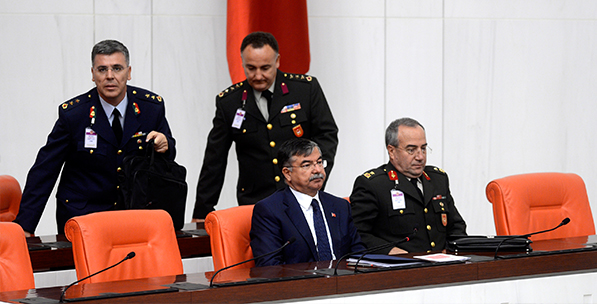At a time when the Turkish government requested the Parliament to authorize the deployment of troops in Syria and Iraq as well as allowing foreign soldiers to transit through Turkey, we have witnessed a significant rise in the number of articles in international media outlets announcing that the Justice and Development (AK) Party's foreign policy has gone bankrupt. Such stories, which represent part of a trend that dates back to the 2009 World Economic Forum in Davos, Switzerland, typically reference other claims about the Erdoğan administration's authoritarian turn and Islamization.
Most recently, a Reuters report criticized the government of Prime Minister Ahmet Davutoğlu in a way that revealed the actual concern about Turkish foreign policy. It is claimed that Turkey's dream of becoming a regional power ended in failure and the founding role it assumed has become a show of arrogance. Similarly, Italian newspaper Il Giornale recently argued that "the tale of moderate Islam's compatibility with democracy was born in Turkey less than a century ago and has died in Turkey." This perspective, which presents the AK Party experience as the failure of the country's transformation as well as the incompatibility of Islam and democracy, has a clear objective: to problematize how Turkey could position itself as a regional power and to question and discredit the AK Party's commitment to making an active contribution to stability in the Middle East.
The idea, in turn, attempts to blame the post-Arab Spring chaos in the region on the Turkish government. As such, proponents of this approach like to identify Turkey as a country consumed by neo-Ottomanist greed, encounters problems with its neighbors, faces defeat in Syria and Egypt, was responsible for the rise of ISIS but also bears the cost of the Kurdish defeat in Kobani. The entire range of the aforementioned criticisms diverts attention from the motive behind Turkey's regional policies. In other words, let us ask: What does Turkey want in the Middle East? It wants regional players to establish a regional order in a peaceful and cooperative manner; it wants governments to reflect the sentiments of their citizens and end the conflicts in the region, most notably the conflict between Palestine and Israel, and contribute to the rise of a new order as a founding actor. Simply put, a combination of freedom and order.
So what does Turkey face? Will it encounter widespread chaos that unsuccessful U.S. interventions and sectarian policies have deepened over the years? Or efforts of non-state actors and terrorist organizations to accumulate political power against a backdrop of dissolving state structures? Will Turkey be confronted by the authoritarian practices of the Assad regime and Abdel-Fattah el-Sissi's administration? Or will its main issue be the influx of Arabs, Yazidis and Kurds finding peace on Turkish soil?
Instead of witnessing the rise of a new order, which Turkey promotes through soft power instruments such as economic and cultural cooperation, the region suffers violent conflict and security breaches. Meanwhile, the threat of ISIS compels the Turkish government to resort to hard power instruments. It was in this sense that the country opted to provide active support to the anti-ISIS coalition along with the emergence of safe zones or a security belt in Syria and Iraq. Regardless of the performance of the weak international coalition that the Obama administration reluctantly put together, Turkey will face challenges down the road including new waves of migrants, the risk of clashes with ISIS, PYD and the Assad regime as well as the possibility of terror spreading into the country.
One thing is clear: Turkey's primary concern relates to the order and freedom of the Middle East. We already know that the two concepts are inherently interrelated. This time though, the Turkish government has decided to match the challenges from its neighbors through hard power instruments. This is obviously a new development. At once, cooperating with the Uni








